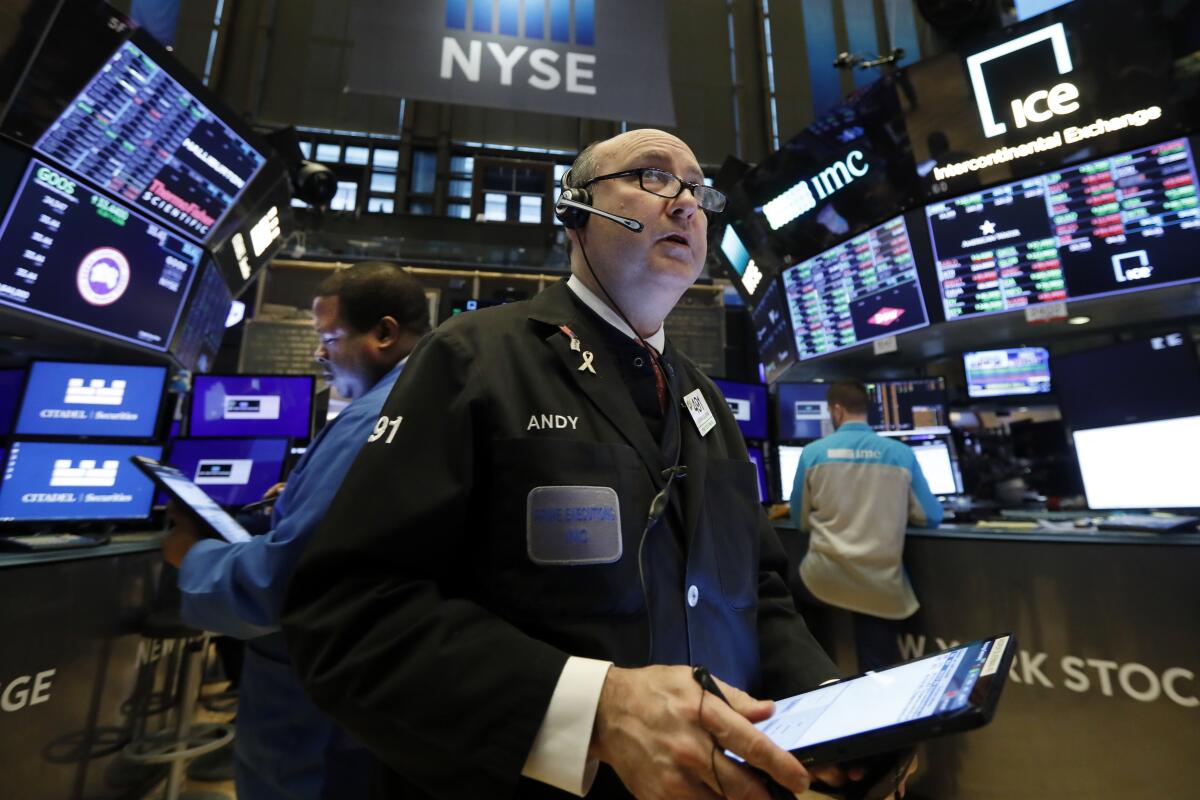Stocks edge up; Dow closes above 29,000 for the first time

- Share via
The Dow Jones industrial average closed above 29,000 points for the first time Wednesday, and the Standard & Poor’s 500 index hit its second record high in three days.
The milestones came on a day when the market traded in a narrow range as investors weighed the latest corporate earnings reports and the widely anticipated signing of an initial trade deal between the United States and China.
The signing of the “Phase 1” U.S.-China trade deal “was telegraphed well enough that the market is kind of looking through it and toward the next phase and what that means,” said Keith Buchanan, portfolio manager at Globalt Investments.
Healthcare stocks accounted for much of the market’s gains. Utilities and makers of household goods also rose. Those gains outweighed losses by financial firms, energy firms and companies that rely on consumer spending.
The S&P 500 index rose 6.14 points, or 0.2%, to 3,289.29, topping the high it reached Monday. The Dow rose 90.55 points, or 0.3%, to 29,030.22. The Nasdaq composite edged up 7.37 points, or 0.1%, to 9,258.70.
Smaller-company stocks fared better than the rest of the market. The Russell 2000 climbed 6.66 points, or 0.4%, to 1,682.40.
Bond prices rose. The yield on the 10-year Treasury note fell to 1.78% from 1.81%.
The U.S.-China trade deal to be signed Wednesday gives Trump some immediate benefits but allows both sides to put off the most difficult issues.
Although limited in its scope, investors have welcomed the U.S.-China deal in hopes that it will prevent further escalation in the 18-month-long trade conflict that has slowed global growth, hurt American manufacturers and weighed on the Chinese economy. The world’s two largest economies will now have to deal with more contentious trade issues as they move ahead with negotiations. And punitive tariffs will remain on about $360 billion in Chinese goods as talks continue.
With the “Phase 1” agreement now a done deal, investors have more reason to focus on the rollout of corporate earnings reports over the next few weeks. Earnings have been flat to down for the last three quarters, and if the fourth quarter meets expectations, it should be around the same.
However, analysts are projecting 2020 corporate earnings growth to jump about 9.5%, which is why traders will be listening this earnings reporting season for any clues about firms’ business prospects in coming months.
“We’re expecting a reacceleration in the back end of the year, so any [company] guidance that brings any type of skepticism to that could threaten the recent rally we’ve had and the gains that we’ve accrued in the past few months,” Buchanan said.
Healthcare stocks powered much of the market’s gains Wednesday. Several health insurers climbed as investors cheered a solid fourth-quarter earnings report from UnitedHealth Group.
UnitedHealth shares rose 2.8% after the nation’s largest health insurer, which covers more than 49 million people, said its revenue climbed 4% on a mix of insurance premiums and growth from urgent care and surgery centers. Anthem shares gained 1.6%, Cigna shares added 1.5%. Humana shares climbed 1.9%.
Technology companies also rose. The sector relies on China for sales and supply chains, and it benefits from better trade relations. Microsoft gained 0.7%. Advanced Micro Devices advanced 0.8%.
Utilities and consumer-staples-sector stocks also notched gains. Edison International climbed 2.5%. PepsiCo rose 1.7%.
Financial stocks fell the most. Bank of America slid 1.8% after reporting weaker profits due to the rapid decline of interest rates in late 2019.
Energy stocks fell along with the price of crude oil. Valero Energy dropped 3.3%.
Homebuilders marched broadly higher on news that U.S. home loan applications surged 30.2% last week from a week earlier. The pickup in mortgage applications reflects heightened demand for homes and suggests many people are eager to buy a home now rather than waiting for the traditional late-February start of the spring homebuying season. Hovnanian Enterprises jumped 6.4%.
Target slumped 6.6% after a disappointing holiday shopping season prompted the retailer to cut its forecast for a key sales measure in the fourth quarter. The company said weak sales of electronics, toys and home goods crimped its sales growth to just 1.4% in November and December.
Benchmark crude oil fell 42 cents to settle at $57.81 a barrel. Brent crude oil, the international standard, fell 49 cents to close at $64 a barrel.
Wholesale gasoline fell 1 cent to $1.64 a gallon. Heating oil declined 3 cents to $1.88 a gallon. Natural gas fell 7 cents to $2.12 per 1,000 cubic feet.
Gold rose $9.70 to $1,552.10 an ounce. Silver rose 25 cents to $17.92 an ounce. Copper fell 1 cent to $2.87 a pound.
More to Read
Inside the business of entertainment
The Wide Shot brings you news, analysis and insights on everything from streaming wars to production — and what it all means for the future.
You may occasionally receive promotional content from the Los Angeles Times.











